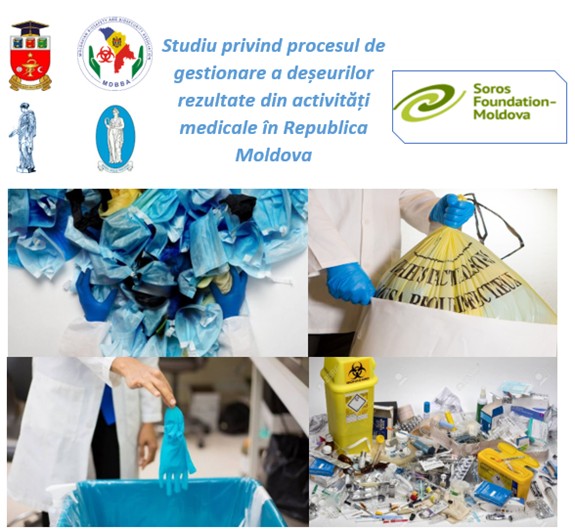Study on medical waste management
- 2405 vues

Between October 1, 2021 – September 30, 2022, the research project “Study on Medical Waste Management Process in the Republic of Moldova” is carried out. The project is implemented by the Epidemiology Discipline and Hygiene Discipline, Department of Preventive Medicine (DPM) of Nicolae Testemitanu State University of Medicine and Pharmacy in partnership with the National Agency for Public Health, Biosecurity and Biosafety Association of Moldova and Hygienists’ Society of the Republic of Moldova, with the financial support of the Soros Foundation Moldova.
The aim of the project is to evaluate and analyze the process of waste management (DRAM) in order to harmonize existing practices and reduce their risks for patients and employees of medical institutions, the environment and public health. The project will analyze the regulatory framework for medical waste management in the Republic of Moldova and will study the current practices of waste management resulting from the medical activity of public and private health institutions. It will also assess the capacity of health institutions in medical waste management, possible risks, and existing mechanisms for neutralization, destruction and recycling of medical waste and will develop recommendations on harmonizing the legal framework and practices of medical waste management, including during the SARS-CoV-2 epidemic.
The project beneficiaries are represented by specialists from public health centers and medical institutions of the country that provide medical care, including in pandemics and, indirectly, the population of the Republic of Moldova. The results of the project will also contribute to the professional development of students and resident doctors.
In the opinion of Luminita Gutu, associate professor at the Epidemiology Discipline, DPM of Nicolae Testemitanu University, this is a topical issue, especially in the context of the epidemic caused by the SARS-CoV-2 virus. “Currently, the volume of infectious waste from medical equipment, laboratories and quarantine and isolation centers has increased, including items of personal protective equipment: masks, respirators, disposable gowns, coveralls, etc., which can have serious consequences on the environment and human health. Poor waste management can endanger medical staff, employees who manage medical waste, patients and their families, as well as the population residing near medical institutions. In addition, improper treatment or disposal of such waste can lead to environmental contamination”, said the speaker.
The results of the project will be reflected in actions to improve the management of medical waste, identification and reduction of risks for patients and medical staff, as well as for the environment and the health of the population as a whole.
Preluarea informației de pe site-ul USMF „Nicolae Testemițanu” poate fi efectuată doar cu indicarea obligatorie a sursei și a linkului direct accesat pe www.usmf.md.



Comentarii